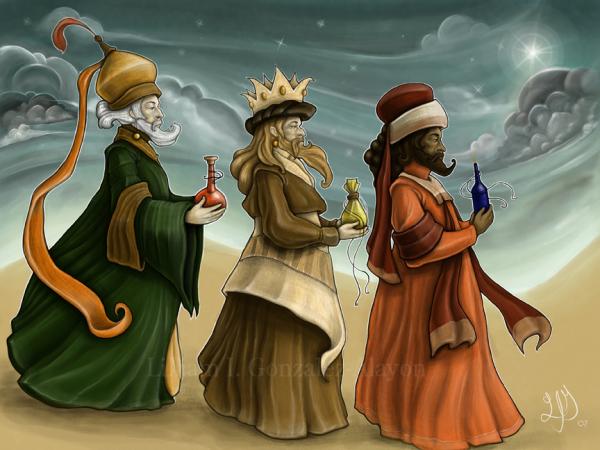Were the Three Wise Man from China?
By Michelle Healy | Dec 10, 2010

The story of the Three Wise Men is one of the most familiar and beloved parts of the Christmas story. But for all of their popularity, the mysterious travelers from the East — known as the Magi — appear in only one short passage in the New Testament, following a star to the site of Jesus’ birth and bringing gifts of gold, frankincense and myrrh. Many religious scholars aren’t even sure they really existed.
Now, a first-ever English translation and detailed analysis of a little-known eighth-century manuscript of a story probably written in the second or third century uncovers a far more substantial version of the wise men story.
Brent Landau, a professor of religious studies at the University of Oklahoma and an expert in ancient biblical languages, found references to a text about the wise men in writings from the Middle Ages and learned that a collector in the 18th century had discovered in a Turkish monastery a manuscript called “the Revelation of the Magi” with a narrative about the wise men. He gave it to the Vatican Library, where the document, written on vellum, a type of parchment made of animal skin, remains archived away in virtual obscurity.
As part of his doctoral dissertation at Harvard Divinity School, Landau spent seven years translating and analyzing the text, written in Syriac, a dialect of Aramaic used by early Christians throughout the Middle East and Asia — and which he happened to be studying. He worked from both a 1927 published text in Syriac and the original document at the Vatican.
Landau’s book, Revelation of the Magi: The Lost Tale of the Wise Men’s Journey to Bethlehem (HarperOne) describes the Magi as an ancient mystical sect descended from Seth, the pious and virtuous third son of Adam and Eve. From Seth they inherited a prophecy of “a star of indescribable brightness” someday appearing and “heralding the birth of God in human form.” This same star had initially hovered over the Tree of Life in the Garden of Eden.
Among the book’s other revelations:
•The Magi are described as coming from a land called Shir, “located in the extreme east of the world, at the shore of the Great Ocean.” In other ancient texts, Shir is referred to “as a place where silk comes from,” says Landau, suggesting that the references were to China.
•In Syriac, the word Magi means “to pray in silence.” Landau says it has no relationship to magicians or astrologers, sometimes cited in stories today.
•The text names 12 Magi, not three, while other parts of the text suggest that “a group the size of a small army” traveled to Bethlehem, says Landau.
Other religion scholars who reviewed Landau’s work recognize the unique interest the wise men narrative holds.
Of the many early Christian documents recently discovered, Magi “is by far the most fascinating,” writes John Dominic Crossan, professor emeritus at DePaul University, in a comment on the book’s back cover.
“Landau is to be congratulated for bringing this important and unexpectedly influential work to light,” adds Jennifer Knust of Boston University School of Theology, in another comment.
Although the text claims to be personal testimony, “it seems unlikely that it could have been written by the Magi themselves,” Landau says. He cites a number of anachronisms, such as references to Christian writings recorded years after Jesus’ death.
Who then wrote the wise men story?
“One guess,” says Landau, “is some kind of religious community of Christian mystics.”
Read more: http://www.usatoday.com/yourlife/mind-soul/spirituality/2010-12-03-three-wise-men_N.htm














